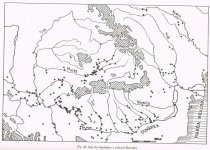I know Albanian is most closed,with most cognates,but I do not speak Albanian.
Anyway,Romanian got cognates from Iranian also.
There is a famous book in Romania,written by greatest Romanian linguist ,name Bogdan Petriceicu Hasdeu called "Pierit-au dacii?" ("Did the Dacians perished?").
(http://en.wikipedia.org/wiki/Bogdan_Petriceicu_Hasdeu)
He gives clear examples of words from Romanian cognates with Indo-Iranic languages.
Albanian is not the closest to Indo-Iranian, at least not more than Balto-Slavic is, in the sense they're all Satem languages. Albanian, or rather Proto-Albanian as what led to modern Albanian included about a millennium of Romance influence, is closest to Baltic (Orel). Baltic languages have most cognates with Albanian, and second would be Greek. Then Germanic cognates are the third biggest. Celtic not so much, pretty insignificant, and the number of cognates with Armenian can be counted in one hand.(A Coincise Historical Grammar of the Albanian language)
buza though, it's an Albanian wanderwort, not Indo-Iranian, although I think it means face in Polish. It's related to Latin basium 'kiss'.
Romanian has a significant number of loanwords from Albanian (from there some have passed into Polish and Ukrainian). For example Albanian sorra with Romanian cioara, 'crow'. We know it's a loanword not substratum because the Proto-Albanian form was *shtsharna (transliterated, I can't copy paste special characters for some reason). On the other hand Romanian does have some cognates with Albanian like modhulla, mazura 'pea', which can't be explained as a loanword. That's the Paleo-Balkanic substratum. But these are not Indo-Iranian. Albanian is not Indo-Iranian, it's its own family. But they are Satem languages, so of course they have similarities.
Really though, where does hudhra 'garlic' (cognate with Greek σκόρδο) comes from?


